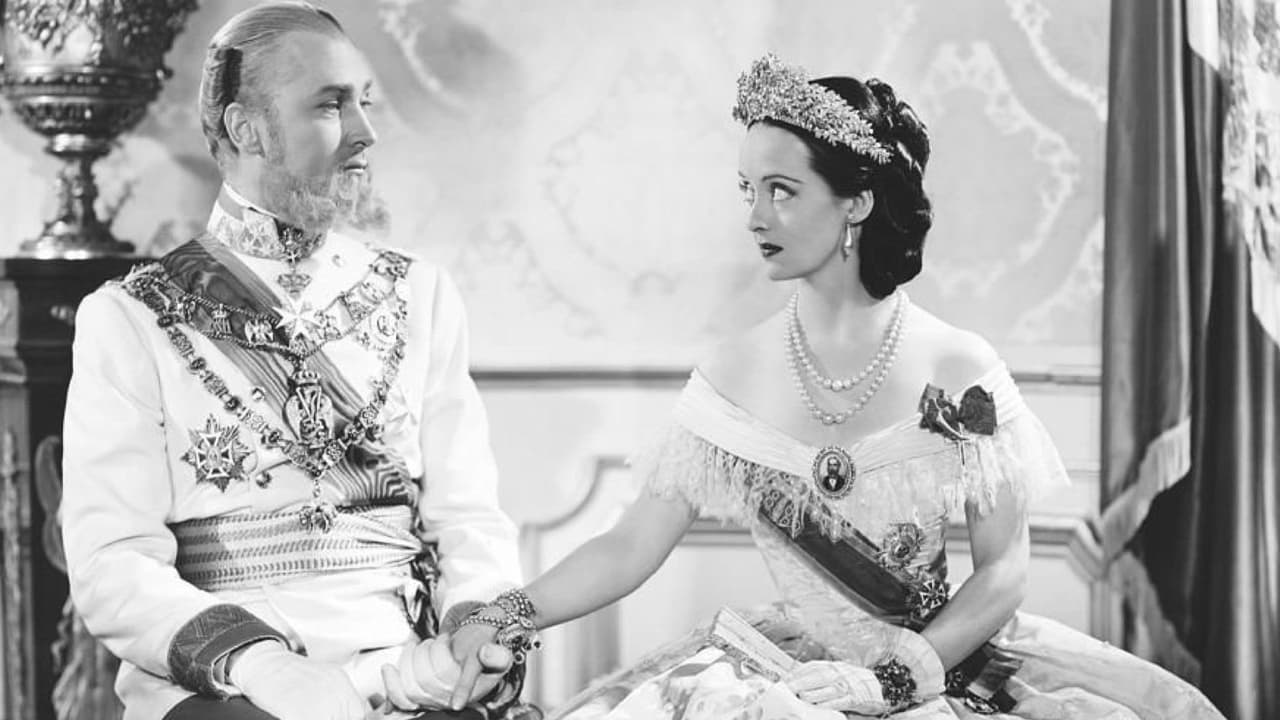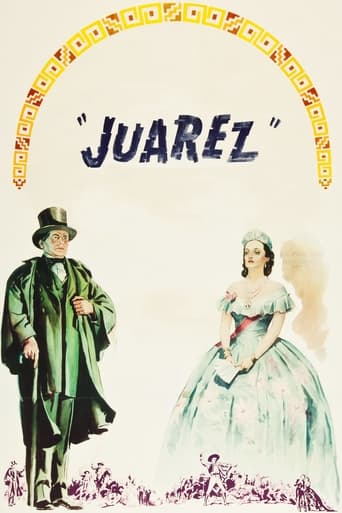

Copyright 10 June 1939 by Warner Brothers Pictures, Inc. New York opening at the Hollywood: 25 April 1939. U.S. release: 10 June 1939. U.K. release: November 1939. Australian release: 12 October 1939. 132 minutes. SYNOPSIS: It is 1863. The French army, in Mexico as an armed bill collector, is failing its purpose. The liberal constitutional government under the Zapotecan Indian, Benito Pablo Juarez, a brilliant, honest statesman and president, will not pay because it cannot. The treasury has been emptied, the country all but ruined by the dictators and militarists who, through the centuries have preceded him in office. NOTES: Negative cost: around $1.4 million. Brian Aherne was nominated for Best Supporting Actor, losing to Thomas Mitchell in Stagecoach. Number 8 on the Film Daily's annual survey of American film critics. COMMENT: Controversial in its day because of its many historical distortions (and indeed fabrications), Juarez is best viewed as a superlative piece of dramatic entertainment. Superbly set and photographed, with brilliant performances, masterly direction, and a Korngold score, what more could you ask? Yes, two more things - and Juarez has them: a riveting script, breathtakingly paced.OTHER VIEWS: A quite impressive film, the two parts of Juarez and Maximilian are well written and admirably acted by Paul Muni and Brian Aherne (Mr Muni's make-up is extraordinarily impressive: he is an Indian to the very shape of the skull and the stony Aztec profile). - Graham Greene.
... View MoreWith a major studio behind it, an all-star cast, a strong team of writers (including John Huston), a glorious score, beautiful costumes, and a fact-based story, this should have been a great film. It is not. The twin handicaps of a dull, dull script and some odd casting make this tedious viewing indeed.A history book of film guide will offer up the synopsis: Louis Napoleon of France seeks to keep control of Mexico's resources by making Archduke Maximillian of Austria and his wife Carlotta puppet rulers, despite the fact that Mexico, led by Benito Juarez, is struggling to establish itself as a republic. Bad things happen. Brian Aherne does the best job among the cast, dealing with subjects he doesn't understand, power he enjoys a little too much, and an increasingly unstable wife. He wins the viewer's sympathy, even though one is made to feel a little guilty liking a dictator, especially when scenes cut to Paul Muni as Juarez gazing with admiration at a portrait of Lincoln and intoning the word "democracy" with spooky reverence. (By the way, check your civics book; a republic is not the same as a democracy.)Muni is a puzzle. Whether he assayed portrayals of historical figures such as Pasteur or Zola or tackled a very exotic role such as the patriarch in "The Good Earth," he did so with dignity, intensity, and a clear understanding of the character. Not so here. In what seemed to be an attempt to portray the endurance and stoicism of Juarez who rose from being an illiterate Indian to a visionary leader, Muni instead delivered a robotic, almost monotone, performance and his make-up man went overboard: he looks like a cross between George Lopez and Raymond Massey in "Arsenic and Old Lace" and sounds like Stephen Hawking.In the scenery-chewing histrionics category, the nominees are Claude Rains as Louis Napoleon and Bette Davis as Carlotta. Claude Rains excels in roles that call for him to be vainglorious, slimy, and double-dealing, but I'll give Davis the edge. No one ever looked less like a dark, smoldering exotic type than she and no one could do nervous-accelerating-to-nuts better. Orson Welles once said there were two things actors could not do convincingly: pray and copulate, and Carlotta in the chapel imploring the Virgin Mary for a child confirms the hypothesis about the first. Since Maximillian and Carlotta never have a child and must resort to adopting a small boy to be their heir, we'll assume the second didn't work out, either.It's bizarre that the cast represents many nationalities and cultures, but with the exception of the always great Gilbert Roland (who was born in Juarez, Mexico), no one is Austrian, French, or Mexican. John Garfield as Diaz tries mightily to master a Meh-hee-can accent but his Lower East Side roots are showing.The film generally is overlong and preachy. The viewer almost feels like grabbing notebook and pen and taking notes, because there's a sense that a pop quiz will follow when the lights come up. History can be the basis for some exciting and exceptional film-making, but this isn't it. Don't see if if you can.(One fun fact: Two of the minor actors, Harry Davenport, as a member of Maximillian's cabinet, and Mickey Kuhn, as the child adopted by the Emperor, also had small roles, as Dr. Meade and Beau Wilkes respectively, in another film of 1939, "Gone with the Wind." It did a little better.)
... View MoreIn 1863, with the Civil War in America nearly won by the North and the Monroe Doctrine about to be imposed, French Emperor Napoleon III realizes he can't overtake Mexico by force and decides to establish a Monarch in the country--much to the dismay of the Mexican people and their president, Benito Juarez, who realize it's a puppet dictatorship. Although the film (based in part on a play from Franz Werfel and also the novel "The Phantom Crown" by Bertita Harding) is satisfactory on an artistic level, it is emotionally hollow. Paul Muni's top-billed performance as Juarez, a man of few words, is nearly swallowed up by the work of his co-stars, all performing at scenery-chewing level. Indeed, much of the dramatic focus is on Brian Aherne and Bette Davis as the Emperor and Empress Hapsburg, who are the pawns in the political game, one that ultimately drives Bette's Empress mad (in scenes verging on self-parody). The picture isn't involving as dramatic entertainment, yet as a cinematic history lesson it has some merit, and Aherne was nominated for a Supporting Actor Oscar. ** from ****
... View MoreThe rating is for historical costuming, as the costuming and hairstyle details are excellent. The odd looking period hair styles that are seen in 1860's tintypes are faithfully rendered and lend a very authentic feel. If you are a stickler for such things, you will get a kick out of this one. Noteworthy is the look of Paul Muni's character, (the chameleon like Muni is alway fun to watch) with a dour looking do, as well as the split beard hair comb of the Hapsburg character, with a center comb part that runs right down the back of his head to the neck. Strange to the modern eye, but typical to the period, it takes guts to trot out your talent with such coiffures. Also, I have the hots for Gale Sondergaard, who plays the sultry Empress.
... View More